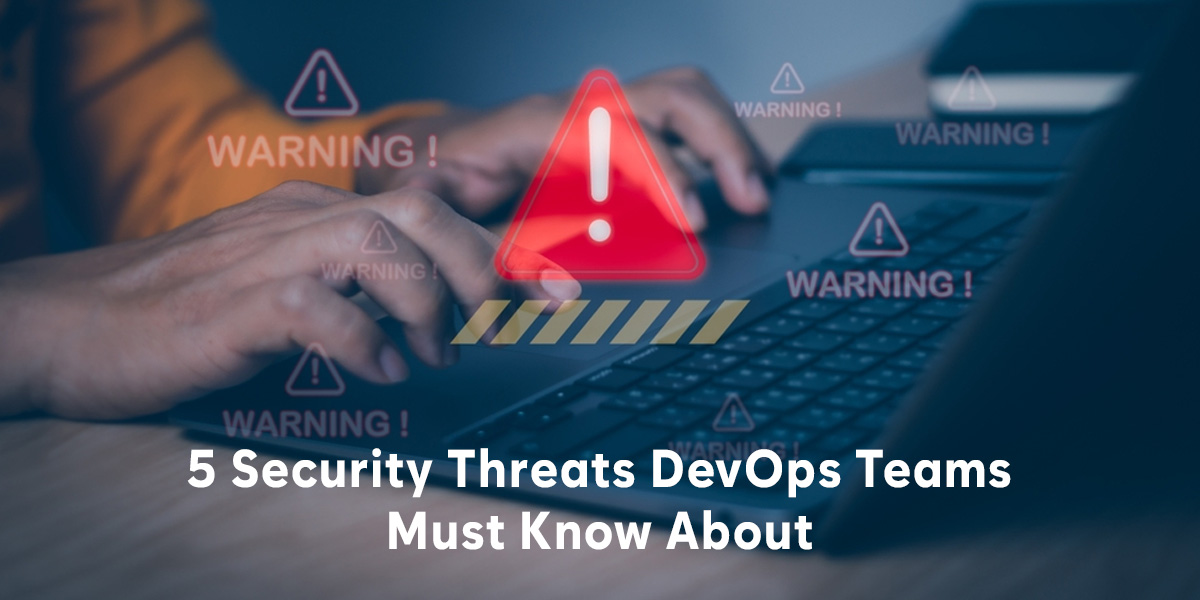In the fast-paced world of DevOps, where development and operations seamlessly intertwine to accelerate software delivery, security often finds itself in a precarious position. While the agility and efficiency of DevOps are undeniable, they can also introduce a plethora of security vulnerabilities if not managed properly.
In this blog post, we will explore five critical security threats that DevOps teams must know about.
Code Vulnerabilities and Injection Attacks
One of the primary concerns for DevOps teams is the proliferation of code vulnerabilities and injection attacks. With continuous integration (CI) and continuous deployment (CD) pipelines automating the software delivery process, the risk of introducing vulnerable code increases manifold. Attack vectors such as SQL injection, cross-site scripting (XSS), and command injection can wreak havoc if left unchecked.
DevOps teams must integrate security checks into their CI/CD pipelines. Tools like static code analysis, dependency scanning, and security testing frameworks can help with this. By identifying and remedying code vulnerabilities early in the development cycle, teams can mitigate the risk of exploitation in production environments.
Container Security Risks
Containers have revolutionized application deployment by providing lightweight, portable, and scalable environments. However, they also introduce unique security challenges for DevOps teams. Container orchestration platforms like Kubernetes have become prime targets for attackers seeking to exploit misconfigurations, insecure APIs, and vulnerabilities in container images. To address these risks, DevOps teams must adopt a holistic approach to container security. This includes hardening container images, implementing least privilege principles, monitoring for anomalous behavior, and regularly patching underlying infrastructure and dependencies.
Cloud Security Vulnerabilities
As organizations increasingly migrate their workloads to the cloud, securing cloud environments has become paramount for DevOps teams. Misconfigurations, weak access controls, and inadequate encryption can leave cloud-based applications and data vulnerable to attacks. DevOps practitioners must embrace cloud-native security practices such as identity and access management (IAM), encryption, network segmentation, and security automation. Additionally, leveraging cloud-native security services and tools provided by cloud service providers can help bolster the security posture of cloud deployments.
Infrastructure as Code (IaC) Weaknesses
Infrastructure as Code (IaC) empowers DevOps teams to automate the provisioning and management of infrastructure using code. While IaC offers numerous benefits in terms of consistency, scalability, and repeatability, it also introduces security risks if not implemented correctly. Insecure configurations, hardcoded secrets, and unvalidated inputs in infrastructure code can expose organizations to data breaches and system compromises.
DevOps teams must prioritize security when writing infrastructure code, employing techniques such as parameterization, secrets management, and infrastructure testing. Regular audits and reviews of IaC templates can help identify and remediate security weaknesses before they are deployed into production environments.
Supply Chain Attacks
Supply chain attacks have emerged as a significant threat to software development and deployment pipelines. Adversaries target the software supply chain to infiltrate trusted repositories, libraries, or dependencies. Thereby, compromising the integrity of applications and environments downstream.
DevOps teams must exercise caution when consuming third-party components and dependencies. Thus, ensuring they originate from reputable sources and are regularly updated and patched. Implementing measures such as software bill of materials (SBOM), dependency tracking, and vulnerability scanning can help mitigate the risk of supply chain attacks and enhance the resilience of DevOps workflows.
Conclusion
DevOps teams must remain vigilant in safeguarding their systems and data against a myriad of security threats. By understanding and addressing the challenges, organizations can bolster their security posture while reaping the benefits of DevOps practices. Collaboration between development, operations, and security teams is essential to embed security into every stage of the DevOps lifecycle effectively. Ultimately, a proactive approach to security will enable DevOps teams to deliver software rapidly without compromising on security.





